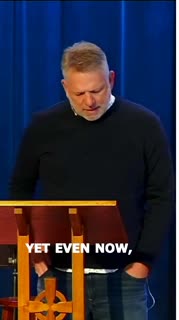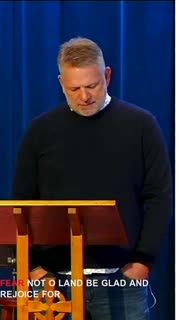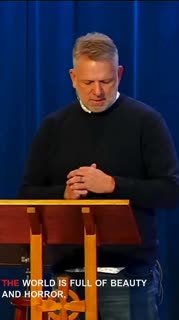From Desolation to Restoration: Embracing God's Promise
Summary
In today's gathering, we began by centering ourselves, acknowledging the diverse emotional and mental states we bring into this space. We invited God to take our burdens so we could be fully present with Him and His Word. We delved into the book of Joel, exploring the themes of judgment and salvation. Joel paints a vivid picture of devastation, likening it to a nightmare filled with locusts and invading armies, symbolizing complete destruction. This imagery resonates with our own experiences of loss and suffering, where it feels as though everything has been stripped away, leaving us in a state of despair.
Yet, amidst this desolation, Joel offers a message of hope and restoration. God promises to restore the years that the locusts have eaten, to bring abundance where there was once barrenness. This promise is not just about physical restoration but also spiritual renewal. God assures us that He will pour out His Spirit on all people, bringing about a transformation that transcends our current circumstances.
We reflected on the mystery of suffering and the hope we find in God's presence. In our darkest moments, we often seek answers, but what we truly need is the assurance of God's presence and His promise to make things right. Jesus' life, death, and resurrection are the ultimate testament to God's ability to restore and redeem. He entered into our suffering, took on our pain, and through His resurrection, demonstrated that love triumphs over death.
As we navigate our own locust-eaten years, we are called to return to God, to repent and receive His Spirit. This call is for everyone, regardless of where we find ourselves today. God invites us to come to Him as we are, to bring our brokenness and emptiness, and to receive His restoration. In doing so, we become a people of repentance, transformed by His grace and sent out into the world to share His love and hope.
Key Takeaways:
1. The Reality of Devastation and Hope of Restoration: Joel's prophecy confronts us with the harsh reality of destruction, yet it also offers a profound promise of restoration. God assures us that He will restore the years the locusts have eaten, symbolizing His power to bring new life and abundance from our deepest losses. This promise invites us to trust in God's ability to redeem and renew, even when we face seemingly insurmountable challenges. [21:40]
2. The Mystery of Suffering and God's Presence: In our suffering, we often seek answers, but what we truly need is the assurance of God's presence. The mystery of suffering is not a problem to be solved but a reality to be endured with faith. God's presence in our lives, especially through Jesus' life, death, and resurrection, provides the hope and strength we need to navigate our darkest moments. [19:04]
3. The Transformative Power of Repentance: Joel calls us to rend our hearts and return to God, emphasizing the transformative power of genuine repentance. This act of turning back to God opens the door for His Spirit to work in us, bringing healing and renewal. Repentance is not just about acknowledging our wrongs but about embracing the new life God offers through His grace. [32:06]
4. Jesus' Participation in Our Suffering: Jesus' willingness to enter into our suffering and take on our pain is a profound demonstration of God's love. His resurrection is the evidence that love triumphs over death and that beauty can emerge from horror. In our own locust-eaten years, we find hope in knowing that Jesus is with us, participating in our suffering and leading us toward restoration. [27:11]
5. The Call to Return and Be Restored: God's invitation to return to Him is a call to experience His grace and restoration. No matter where we are or what we've done, God welcomes us with open arms, ready to restore and renew us. This call to return is an invitation to participate in the abundant life God offers, a life marked by His presence and the joy of being His people. [33:13]
Youtube Chapters:
- [00:00] - Welcome
- [03:07] - Opening Prayer
- [03:55] - Introduction to Joel
- [05:07] - Call to Return to God
- [06:06] - God's Promise of Restoration
- [10:42] - Exploring Our Nightmares
- [11:36] - Confronting Our Fears
- [12:18] - Feeling Abandoned by God
- [13:00] - The Oracle of Judgment
- [14:19] - The Devastation of Locusts
- [16:03] - Lament and Mourning
- [17:41] - The Day of the Lord
- [18:27] - Vulnerability and Trust
- [19:04] - Mystery and Suffering
- [20:02] - The Story of Aurel
- [21:40] - God's Promise of Restoration
- [24:07] - Jesus' Sacrifice and Restoration
- [25:25] - The Horror of the Cross
- [26:22] - Resurrection and Hope
- [29:18] - Pentecost and New Life
- [31:22] - How to Receive God's Spirit
- [32:06] - Call to Repentance
- [33:13] - The Good News of Restoration
- [34:40] - Prayer and Invitation to the Table
Study Guide
Bible Study Discussion Guide
Bible Reading:
- Joel 1:1-4, 2:12-32
---
Observation Questions:
1. What imagery does Joel use to describe the devastation in the land, and how does this relate to the people's experience of loss? [13:00]
2. How does Joel describe God's character in Joel 2:12-13, and what does this reveal about God's response to repentance? [05:07]
3. What promise does God make to His people in Joel 2:25-27, and how does this promise address the devastation they have experienced? [21:40]
4. How does the sermon describe Jesus' participation in our suffering, and what significance does this have for believers? [27:11]
---
Interpretation Questions:
1. In what ways does the imagery of locusts in Joel symbolize the broader experiences of loss and devastation in our lives? How might this imagery help us understand our own struggles? [13:00]
2. How does the promise of restoration in Joel 2:25-27 challenge or encourage believers to trust in God's ability to redeem their past experiences? [21:40]
3. What does the sermon suggest about the role of repentance in experiencing God's restoration, and how might this apply to the lives of believers today? [32:06]
4. How does Jesus' willingness to enter into human suffering provide a model for how believers can find hope and restoration in their own lives? [27:11]
---
Application Questions:
1. Reflect on a time when you felt like you were living through "locust-eaten years." How did you respond, and what might you do differently now in light of Joel's message? [13:00]
2. Joel calls us to "rend our hearts" and return to God. What does genuine repentance look like in your life, and how can you cultivate a heart open to God's transformative work? [32:06]
3. Consider the promise that God will restore the years the locusts have eaten. What specific areas of your life do you need to trust God for restoration, and how can you actively participate in this process? [21:40]
4. How can you be more aware of Jesus' presence in your suffering, and what practical steps can you take to invite Him into those areas of your life? [27:11]
5. The sermon emphasizes the importance of God's presence over seeking answers in suffering. How can you cultivate a deeper awareness of God's presence in your daily life, especially during challenging times? [19:04]
6. Reflect on the call to be a people of repentance and transformation. How can you share the hope and love of God with others in your community, especially those who may be experiencing their own "locust-eaten years"? [34:40]
7. In what ways can you incorporate the practice of communal worship and fellowship, as described in the sermon, to strengthen your relationship with God and others? [24:07]
Devotional
Day 1: God's Promise of Restoration in Desolation
In the book of Joel, we encounter a vivid depiction of devastation, symbolized by locusts and invading armies. This imagery resonates with our own experiences of loss and suffering, where it feels as though everything has been stripped away. Yet, amidst this desolation, God offers a profound promise of restoration. He assures us that He will restore the years that the locusts have eaten, symbolizing His power to bring new life and abundance from our deepest losses. This promise invites us to trust in God's ability to redeem and renew, even when we face seemingly insurmountable challenges. [21:40]
Joel 2:25-26 (ESV): "I will restore to you the years that the swarming locust has eaten, the hopper, the destroyer, and the cutter, my great army, which I sent among you. You shall eat in plenty and be satisfied, and praise the name of the Lord your God, who has dealt wondrously with you. And my people shall never again be put to shame."
Reflection: Think of a time when you felt everything was lost. How can you invite God into that memory today to begin the process of restoration and healing?
Day 2: Embracing the Mystery of Suffering with Faith
Suffering often leaves us searching for answers, but what we truly need is the assurance of God's presence. The mystery of suffering is not a problem to be solved but a reality to be endured with faith. God's presence in our lives, especially through Jesus' life, death, and resurrection, provides the hope and strength we need to navigate our darkest moments. In these times, we are reminded that God is with us, offering His comfort and peace. [19:04]
2 Corinthians 1:3-4 (ESV): "Blessed be the God and Father of our Lord Jesus Christ, the Father of mercies and God of all comfort, who comforts us in all our affliction, so that we may be able to comfort those who are in any affliction, with the comfort with which we ourselves are comforted by God."
Reflection: In what ways can you seek and recognize God's presence in your current struggles, and how might this change your perspective on suffering?
Day 3: The Transformative Power of Genuine Repentance
Joel calls us to rend our hearts and return to God, emphasizing the transformative power of genuine repentance. This act of turning back to God opens the door for His Spirit to work in us, bringing healing and renewal. Repentance is not just about acknowledging our wrongs but about embracing the new life God offers through His grace. It is a call to experience the fullness of His love and to be transformed by His Spirit. [32:06]
Acts 3:19-20 (ESV): "Repent therefore, and turn back, that your sins may be blotted out, that times of refreshing may come from the presence of the Lord, and that he may send the Christ appointed for you, Jesus."
Reflection: What is one area of your life where you need to turn back to God? How can you take a step towards genuine repentance today?
Day 4: Jesus' Participation in Our Suffering
Jesus' willingness to enter into our suffering and take on our pain is a profound demonstration of God's love. His resurrection is the evidence that love triumphs over death and that beauty can emerge from horror. In our own locust-eaten years, we find hope in knowing that Jesus is with us, participating in our suffering and leading us toward restoration. This assurance allows us to face our challenges with courage and hope. [27:11]
Hebrews 4:15-16 (ESV): "For we do not have a high priest who is unable to sympathize with our weaknesses, but one who in every respect has been tempted as we are, yet without sin. Let us then with confidence draw near to the throne of grace, that we may receive mercy and find grace to help in time of need."
Reflection: How can you invite Jesus into your current struggles, knowing that He understands and shares in your suffering?
Day 5: The Call to Return and Be Restored
God's invitation to return to Him is a call to experience His grace and restoration. No matter where we are or what we've done, God welcomes us with open arms, ready to restore and renew us. This call to return is an invitation to participate in the abundant life God offers, a life marked by His presence and the joy of being His people. It is a reminder that we are never too far gone for God's love to reach us. [33:13]
Isaiah 55:6-7 (ESV): "Seek the Lord while he may be found; call upon him while he is near; let the wicked forsake his way, and the unrighteous man his thoughts; let him return to the Lord, that he may have compassion on him, and to our God, for he will abundantly pardon."
Reflection: What steps can you take today to return to God and embrace the restoration He offers? How can you make this a daily practice?
Quotes
"Yet even now, declares the Lord, return to me with all your heart, with fasting, with weeping, and with mourning, and rend your hearts and not your hearts. Return to the Lord your God, for he is gracious and merciful, slow to anger, and abounding in steadfast love. He relents over disaster." [00:05:07] (19 seconds)
"Fear not, O land, be glad and rejoice, for the Lord has done great things. Fear not, you beasts of the field, for the pastors of the wilderness are green, the tree bears its fruit, the fig tree and vine will give their full yield." [00:06:06] (13 seconds)
"I will restore to you the years that the swarming locust has eaten, the hopper, the destroyer, and the cutter, my great army which I sent among you. You shall eat in plenty and be satisfied and praise the name of the Lord your God, who has dealt wondrously with you." [00:06:06]
"The world is full of beauty and horror, but the unchanging reality, the mystery of all mysteries, is that the love of God creates, sustains, and redeems all things, including you, including your pain, including your loss, including the devastation, including your story." [00:33:13] (20 seconds)
"As we bring our nothingness and our open hands, symbolic of the devastation that sin has done and wrought in us, You fill us up as the host with a feast, bread and wine, and a people, a people that aren't our people, a family that's bigger than our blood relatives." [00:34:40] (30 seconds)
"Help us to swallow the gift of repentance whole this morning. That this would be an altar of repentance, that we would return to you, all of us, every one of us, come to the table, empty-handed, in need, you bringing our restoration." [00:34:40]




